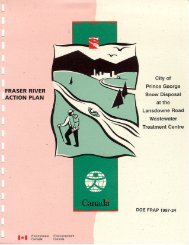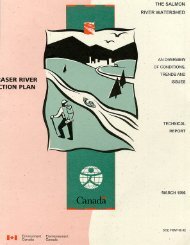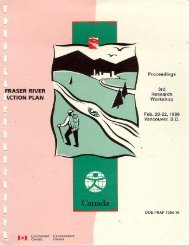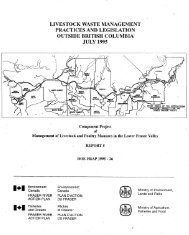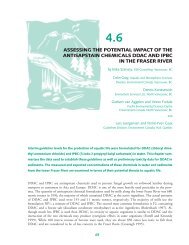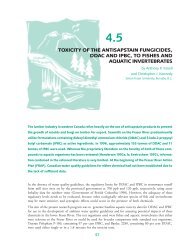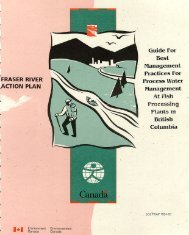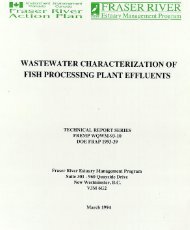A Spill Risk Assessment of the Enbridge Northern Gateway Project
A Spill Risk Assessment of the Enbridge Northern Gateway Project
A Spill Risk Assessment of the Enbridge Northern Gateway Project
You also want an ePaper? Increase the reach of your titles
YUMPU automatically turns print PDFs into web optimized ePapers that Google loves.
7. To assess <strong>the</strong> impact <strong>of</strong> deficiencies in <strong>Enbridge</strong>’s analysis <strong>of</strong> tanker spill risk estimates,<br />
we undertake additional sensitivity analysis based on <strong>the</strong> following scenarios:<br />
a) Combining <strong>the</strong> four sensitivity parameters that were tested separately by <strong>Enbridge</strong><br />
(higher scaling factors for grounding, higher ship traffic, extended route, and higher<br />
number <strong>of</strong> tankers)<br />
b) Using incident frequencies derived from Lloyds Register Fairplay data without <strong>the</strong><br />
scaling factor adjustments for BC conditions that were done by <strong>Enbridge</strong> without<br />
sufficient documentation or justification<br />
c) Increasing conditional probabilities by five percentage points<br />
d) Increasing tanker traffic to transport pipeline throughput <strong>of</strong> 1,125 kbpd (850 kbpd<br />
<strong>of</strong> oil and 275 kbpd <strong>of</strong> condensate), which is <strong>the</strong> design capacity <strong>of</strong> <strong>the</strong> ENGP<br />
e) Increasing tanker traffic associated with replacing very large crude carriers (VLCC)<br />
with smaller Suezmax and Aframax tankers to transport throughput <strong>of</strong> 1,125 kbpd<br />
<strong>of</strong> oil and condensate<br />
f) Testing <strong>the</strong> combined effect <strong>of</strong> all <strong>the</strong> above parameters.<br />
8. <strong>Enbridge</strong> did not complete any sensitivity analysis for oil or condensate spills at<br />
Kitimat Terminal. To address this deficiency, we undertake a sensitivity analysis for<br />
marine terminal operations based on <strong>the</strong> following scenarios:<br />
a) Increasing tanker traffic to transport pipeline throughput <strong>of</strong> 1,125 kbpd (850 kbpd<br />
<strong>of</strong> oil and 275 kbpd <strong>of</strong> condensate), which is <strong>the</strong> design capacity <strong>of</strong> <strong>the</strong> ENGP<br />
b) Replacing larger VLCCs with smaller tankers to transport throughput <strong>of</strong> 1,125 kbpd<br />
<strong>of</strong> oil and condensate that results in an increase in <strong>the</strong> number <strong>of</strong> tanker loadings.<br />
9. <strong>Enbridge</strong> did not complete any sensitivity analysis for oil or condensate spills from <strong>the</strong><br />
ENGP pipelines. To address this deficiency, we undertake a sensitivity analysis based<br />
on <strong>the</strong> following scenarios:<br />
a) Using actual spill rates provided by <strong>Enbridge</strong> for <strong>Enbridge</strong>’s liquids pipeline system<br />
for <strong>the</strong> years 2002-‐2010<br />
b) Using spill rates from <strong>the</strong> NEB for pipebody and operational leaks exceeding 1.5 m 3<br />
or 9 barrels (bbl).<br />
10. Table ES-‐2 summarizes <strong>the</strong> impacts <strong>of</strong> <strong>the</strong> sensitivity analyses. The results provide a<br />
range <strong>of</strong> possible spill rates for <strong>the</strong> ENGP and show that <strong>the</strong> impact <strong>of</strong> <strong>the</strong> alternative<br />
scenarios on spill rates is significant:<br />
• The tanker spill return period is between 23 and 196 years, well below <strong>Enbridge</strong>’s<br />
mitigated tanker spill estimate <strong>of</strong> 250 years. This lower estimate <strong>of</strong> 23 to 196 years<br />
still underestimates spill risk because it does not correct for all <strong>the</strong> deficiencies in<br />
<strong>Enbridge</strong>’s spill risk methodology such as underreporting <strong>of</strong> incidents.<br />
• The terminal spill return period is between 15 and 41 years compared to <strong>Enbridge</strong>’s<br />
estimate <strong>of</strong> 62 years.<br />
• The pipeline spill return period <strong>of</strong> 0.1 years (between 15 and 16 spills per year)<br />
based on <strong>the</strong> actual spill rate experienced on <strong>the</strong> <strong>Enbridge</strong> liquids pipeline system<br />
from 2002 to 2010 is 31 times higher than <strong>the</strong> 2 year return period estimated by<br />
<strong>Enbridge</strong>.<br />
iii



